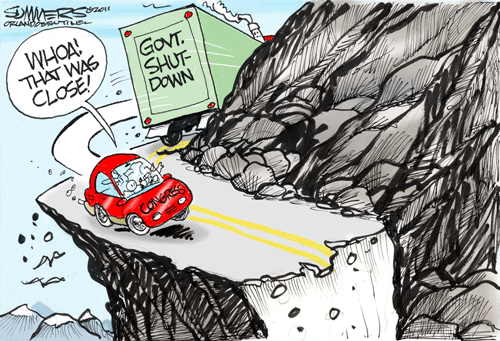 Apparently the rating agencies don’t like either the Republican or Democratic plans to raise the debt ceiling and address the deficit. Love them or hate them, the rating agencies still have huge power over credit ratings and have warned raising the debt ceiling and cutting spending is not enough:
Apparently the rating agencies don’t like either the Republican or Democratic plans to raise the debt ceiling and address the deficit. Love them or hate them, the rating agencies still have huge power over credit ratings and have warned raising the debt ceiling and cutting spending is not enough:
Market analysts and investors increasingly say yes. The outcome won’t be quite as scary as a default, but financial markets would still take a blow. Mortgage rates could rise. States and cities, already strapped, could find it more difficult to borrow. Stocks could lose their gains for the year.
“At this point, we’re more concerned about the risk of a downgrade than a default,” said Terry Belton, global head of fixed income strategy at JPMorgan Chase. In a conference call with reporters Tuesday, Belton said the loss of the country’s AAA rating may rattle markets, but it’s “better than missing an interest payment.”
snip
Standard & Poor’s warned earlier this month that there was a 50-50 chance of a downgrade, if Congress and President Obama failed to find a “credible solution to the rising U.S. government debt burden.” S&P said it may cut the U.S. rating to AA within 90 days. Passing a $4 trillion agreement could prevent a downgrade, S&P said.
The other chief rating agency, Moody’s Investors Service, said the U.S. government would likely keep its top rating if it avoids a default.
CNN’s Erin Burnett also reported from her sources that neither bill may be adequate to keep the US credit rating from being down graded:
“I think it is important to emphasize that most people think both of the plans are really Band-Aids and don’t deal in any significant way with the spending and cost issues in the country,” Burnett said. “The issue was that Speaker Boehner’s plan does not cut enough spending right away. Harry Reid’s plan would cut about $2.7 trillion. Just because it is bigger than Speaker Boehner’s plan is really the reason the Boehner plan may still trigger a downgrade.”
The ratings agencies aren’t alone in their criticism. there is plenty of opposition from both sides in the deficit debacle. Zero Hedge noted:
Paul Craig Roberts – a true conservative, who was a Wall Street Journal editor and Assistant Secretary of the Treasury under Reagan – slams the Republican intransigence on the debt.
The Reid plan came under fire from Anti War for its alleged trillion dollar saving from the draw down of the two wars:
Senate Democrats have issued a new “savings” plan that would nominally pare the projected deficit by over $1 trillion simply by assuming that the costs of the wars in Iraq and Afghanistan will eventually go away by virtue of those wars ending.
This has spawned a myriad of criticism, including a leaked Goldman Sachs memo warning that the nation faces a credit downgrade if it tries to use this sort of on-paper gimmick instead of actual cuts in spending.
And indeed, while politicians may be comfortable with the notion that the wars will end at some point in the next decade, it isn’t clear at all that this will be the case. Officials are already talking up continuing in Afghanistan long beyond 2014, while the war in Iraq seems set to be extended for “years to come.”
The memo noted that this war savings was only a problem “without a credible follow-on process,” which is to say an actual effort to end those wars. Given strong Democratic opposition to other efforts to end wars (including the ongoing war in Libya), it seems hard to believe officials are looking at doing anything credible about the seemingly endless conflicts.
The damage may already have been done. A small ratings agency based in China, Dagong Global Credit Rating Co., said it would down grade the US next week even if the debt ceiling is raised before August 2, citing the acrimonious fight has already damaged investor confidence.
It would seem that the Republicans and Democrats have already driven off the cliff and the crash will be as early as next week.


Recent Comments